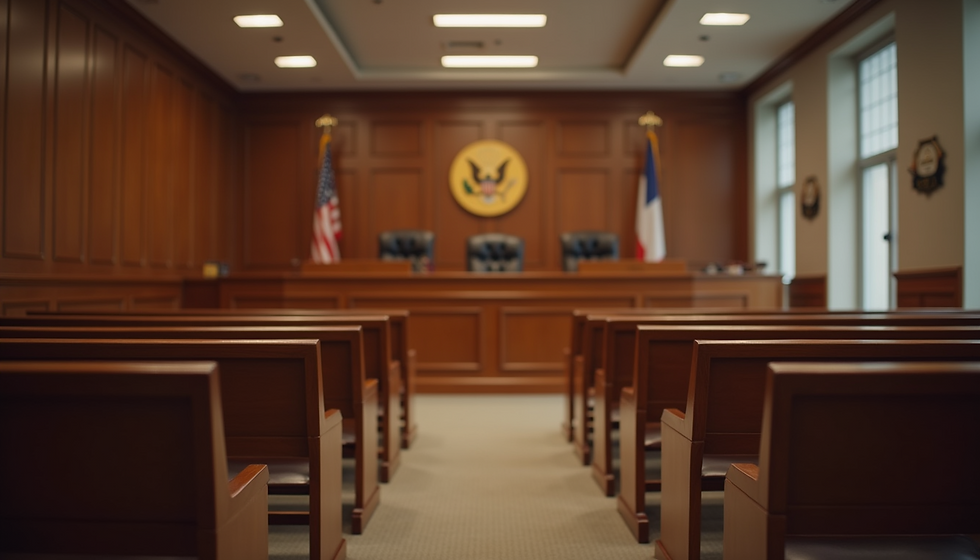Former St Charles County Deputy Ryan Kuehner's Insights on Navigating the Court System
- ryankuehner
- 2 days ago
- 4 min read
Former St. Charles County Deputy Ryan Kuehner shares valuable insights based on his law enforcement experience to help demystify the court process. This post will explore Kuehner's perspectives and provide practical tips for those involved in legal proceedings.
Understanding the Court System
The court system's purpose is to uphold justice and resolve legal disputes fairly. Yet, for many, it may appear confusing. The court system is divided into several categories, including:
Local Courts: Handle minor civil disputes and small claims, usually up to $10,000.
State Courts: Address most legal issues, including family law, criminal cases, and civil suits.
Federal Courts: Deal primarily with cases involving federal laws or disputes between states, with more stringent standards.
Understanding which court will manage your case is crucial for a smoother experience. For example, filing a small claims case in a state court could lead to unnecessary delays because the matter may actually belong in a local court.
The Role of Legal Representation
One of the biggest decisions is whether to seek legal representation. While some individuals may feel confident enough to represent themselves, hiring an attorney can significantly enhance your chances of a favorable outcome.
Kuehner emphasizes that an experienced attorney can offer advantages like:
Document Preparation: Ensuring all forms and evidence are filed correctly and on time.
Court Representation: Advocating for you in front of the judge or jury.
For example, an attorney can help ensure that deadlines for filing motions are met—missing a deadline can sometimes mean losing your case outright.
Preparing for Court
Preparation is key to success in legal matters. Kuehner advises gathering all relevant documents before your court date, including:
Contracts or agreements related to your case.
Photographs relevant to your claim.
Witness statements or affidavits that support your position.
Familiarity with the specific rules and procedures of the court where your case will be heard can also make a big difference. For instance, certain courts may require evidence to be submitted days in advance, while others may allow it to be presented on the day of the hearing.

The Importance of Communication
Clear communication is crucial in the courtroom. Kuehner points out the need for precise conversations with your attorney and respectful interactions with the court. When stating your case:
Present your key arguments clearly.
Stay focused on the crucial issues without wandering off-topic.
Courts expect professionalism; addressing the judge correctly and waiting for your turn to speak can create a respectful atmosphere and influence the court's perception of your case positively.
Understanding Court Procedures
Each court operates under its own set of rules. Kuehner emphasizes that knowing these rules can significantly influence the outcome of your case. For example:
Filing a motion improperly can lead to exclusion of your evidence.
Responding to a subpoena incorrectly can put your case in jeopardy.
Awareness of deadlines is also essential. For instance, courts typically have strict timelines for document submissions. Missing these deadlines can lead to unfavorable outcomes.
The Role of Evidence
Evidence is fundamental to court cases. Kuehner highlights that gathering strong supporting evidence can make a significant difference in your case. This could include:
Physical evidence (like medical records or accident reports).
Witness testimonials that can back up your claims.
Understanding the rules about what evidence can be presented is critical, as not all evidence is admissible in court. Your attorney can help you identify the strongest pieces of evidence and guide you in how to present them effectively.
The Emotional Aspect of Court Proceedings
Court cases can be emotionally draining. Kuehner understands that stress, anxiety, and uncertainty often accompany legal disputes. Taking care of your mental well-being is essential.
Reaching out to friends, family, or seeking help from a mental health professional can provide much-needed support. Techniques like mindfulness or meditation can help ease stress, helping you stay focused during the legal process.
The Outcome of Court Cases
It's essential to accept that not all cases end favorably. Kuehner suggests being prepared for various outcomes, including the chance of losing. Having a response plan for an adverse ruling can help soften the emotional blow.
If you disagree with the judge's decision, you might have the option to appeal. Keep in mind that the appeals process has its own specific rules and deadlines, so consulting with your attorney about this route is crucial.

The Importance of Post-Court Actions
After a case concludes, follow-through is often necessary. Kuehner stresses the importance of complying with any court orders, which may include:
Paying fines or fees.
Adhering to custody arrangements.
Neglecting these responsibilities could result in further complications, such as contempt of court charges. It's vital to understand what is required of you after the ruling and to take it seriously.
Final Thoughts
While navigating the court system can undoubtedly be complex, the right knowledge and preparation can empower you to advocate for yourself effectively. Former St. Charles County Deputy Ryan Kuehner states with the proper guidance, it can help demystify the process.
By recognizing the inner workings of the court system, appreciating the value of legal support, and engaging in thorough preparation, you can approach your situation with greater confidence. Effective communication, diligent evidence gathering, and self-care throughout this journey will further contribute to your ability to handle the challenges ahead. With these tools at your disposal, you stand in a better position to achieve a positive resolution.


